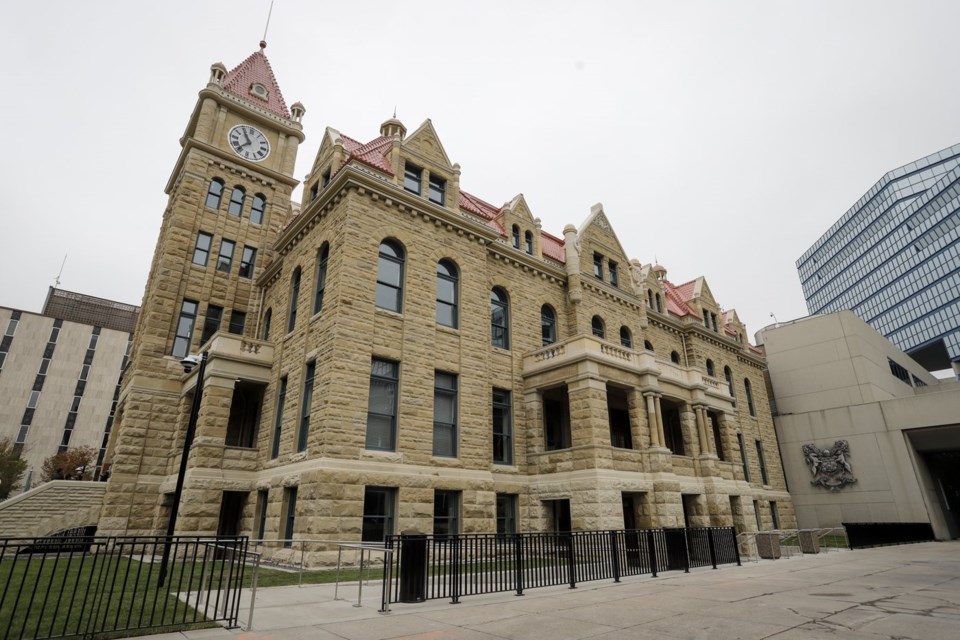RED DEER, ALBERTA, CANADA — A Calgary city councillor's plea to have permanent residents be given the right to vote in municipal elections, an idea long dismissed by Premier Danielle Smith as unconstitutional, has been defeated.
Coun. Courtney Walcott made his case to fellow municipal officials from across the province this week during the Alberta Municipalities annual conference.
In an emotional and lengthy debate, mayors and councillors from municipalities big and small implored one other to reconsider who exactly they represent in office.
Walcott's resolution needed a majority to pass but only got about 42 per cent support in the end -- 46 votes short.
If the votes were in his favour, Alberta Municipalities, the organization that represents villages, towns, and cities throughout the province, would have adopted the motion and lobbied the provincial government to make the necessary changes to the Local Authorities Election Act.
Those with permanent residency status hold many of the same privileges as Canadian citizens -- individuals can work, own property, pay taxes and more -- but they can't vote in elections or obtain a Canadian passport.
The debate on Walcott's proposal Thursday was the longest of all 21 resolutions up for discussion as officials from over a dozen municipalities weighed in.
Concerns about "watering down" the privileges of citizenship were expressed, a passport was used as an argumentative prop and tears were shed.
Barrhead, Alta., town councillor Rod Klumph argued that giving permanent residents the ability to vote in municipal elections would "diminish the right of Canadians to rule themselves."
"The people who have permanent residency also retain their citizenship in the country they left, and that's what concerns me," he said.
Edmonton Mayor Amarjeet Sohi, who is also a former member of Parliament, disagreed with the implication that permanent residents aren't engaged or loyal to Canada.
"It took me about 10 years to gain citizenship because of various reasons ... but I have been loyal to this country from the day I landed here," said Sohi.
"I volunteered for politicians. I made donations to politicians. I went door to door to convince Canadian citizens to vote for a politician. But as a permanent resident for 10 years while I was doing that, I was not able to have my right to vote."
Sam Munckhof-Swain, a councillor in Beaumont, Alta., echoed Sohi, saying his path to citizenship was also prolonged.
"That took years, and all that time I paid taxes in my municipality, and I never had a chance to vote for the people who I wanted to make my community better," said Munckhof-Swain.
"It's not taking anything away from you. It's giving more rights to people and making our communities more welcoming."
When it was his turn to speak, Penhold, Alta. town councillor Cam Galisky held up a Canadian passport and said it was one of two "sacred" privileges of being a citizen.
"The other most sacred and most fought over was the right for the citizens to control their own destiny through their own votes," Galisky said.
"This will diminish that sacred right."
Edmonton city councillor Aaron Paquette, who is Métis, said through tears that Indigenous people were long denied the right to vote in Canadian elections, and he didn't want to see history continue to repeat itself by denying permanent residents that same right.
"It wasn't until the 1960s that Indigenous people in Canada were finally granted the full right to vote without having to give up our identity," Paquette said. "There were people at that time who felt that granting Indigenous people the right to vote would water down or dilute that sacred responsibility.
"They were wrong, and they could not have been more wrong."
Other personal connections to the issue were shared during debate to argue both for and against the resolution,
Charis Aguirre, the mayor of Clyde, Alta., said she was married to a permanent resident, but she was against the proposal.
Airdrie, Alta., councillor Heather Spearman cited her stepmother, and said that since her stepmother's tax money was just as valuable as a Canadian citizen's, she should have the right to vote on how it's spent.
The debate, to some extent, was already a moot point.
In the spring, Smith rejected the idea shortly after Calgary city council approved the resolution for consideration at the Alberta Municipalities conference.
She said on social media at the time that while non-Canadian citizens are welcome to work and live in Alberta, only citizens should have the right to vote.
"That's how it works," she said.
Walcott said Thursday that he knew his resolution would generate a hearty discussion.
"I knew that the discussion would be about citizenship on (a) grander scale, but I was hoping that the nuance of local government would win out," he said.
"We are not talking about provincial governments. We are not talking about the federal government. We're talking about your neighbours."
This report by The Canadian Press was first published Sept. 28, 2024.
Jack Farrell, The Canadian Press




